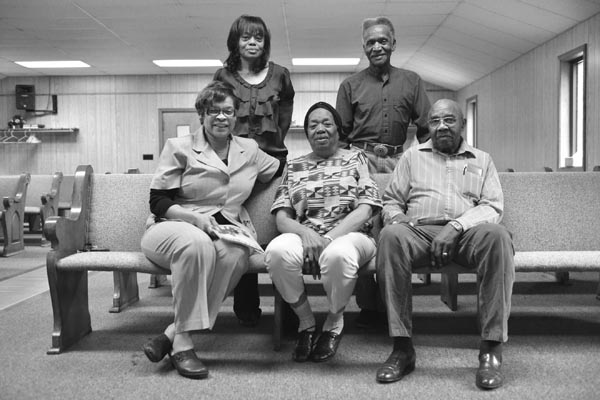"We're Here for Service"
United Gospel Singers
By Rebecca Kimmons
Photographs by Tyler Evert

The United Gospel Singers from Fayette County have been singing together since 1959. Seated, from the left, are Jean Garrett, Bertha Wallace, and Judson Wallace; standing are Linda Wallace and Don White. Photograph by Tyler Evert.
It’s good to know Judson Wallace of Armstrong Creek, Fayette County. He is respected in his community by whites and blacks alike as a man who gets things done. He and his wife, Bertha, worked tirelessly to refurbish the old Armstrong Creek elementary school as a community center. It’s busier than ever now, serving meals five days a week to seniors and community members who need help, and hosting wedding receptions, birthday parties, family reunions, gospel sings, and other events on evenings and weekends. Bertha and Judson, their daughter Charlotte Belinda (called Linda), and a host of friends and family work together on fund-raising events to help keep the doors open.
One of Judson’s biggest and most recent projects was raising funds to update his community’s water treatment plant.
I met him early in 2004, when I was working on funding for a Friends of Old-Time Music and Dance (FOOTMAD) festival. Judson was the chief assistant to the Sergeant at Arms for the State Senate, and he knew just where to point me. This pleasant experience planted a seed of friendship for me with Judson and Bertha, along with the family and friends with whom they have been singing unaccompanied gospel music since 1959.
During the time I was trudging the Capitol halls, Judson gave me an old cassette tape marked “United Baptist Singers.” I took it home, popped it in the tape player, and soon found myself rocking out to the same kind of syncopated rhythm and rich harmony I have so admired in recordings of African American vocal groups from the early to mid-20th century. The tape featured a honeyed, supple female voice often taking the lead, and other female voices joining in, running up and down the scales in jazz progressions, sometimes with a touch of dissonance. Male voices held down bass and baritone parts. They tripped me up with intricate rhythms as I tried to sing along. The music had all the power of old-school rhythm ‘n’ blues, but the words were all about the Lord.
I learned later that the low-register female voice that flowed so easily through several songs belonged to Legirtha Radford. The strong, soaring female tenors belonged to Bertha Wallace and Seureda White. Don White, Seureda’s husband, brought smooth, steady, and sustained harmony, and the bass that sometimes lined out a first verse and often delivered a well-placed punch, belonged to Judson. Together, the five of them were making some complex and intriguing harmonies. The rhythmic handclapping was provided by an enthusiastic audience, who had gathered for a Sunday afternoon West Virginia Baptist Quartet Convention, probably sometime in the 1970’s or ’80’s. It was never important to any of the group to keep a record of when this tape was made. The singing was all that mattered to them.
“We started singing up at Mama’s house,” Bertha tells me one Friday afternoon as the group gathers at the Eagle church for a practice in November 2011. “We’d go to Mama’s after church, and after dinner we’d sing. We’d go from one house to another each Sunday, having dinner together and singing.”
“The thing of it was, we were just fellowshipping - visiting and the like,” says Judson. “I had no intention of ever singing in public with the women. I didn’t think males and females could sing together in quartet or small harmony groups. I was used to men’s baritone, tenor, and bass voices blending, and I couldn’t see how women’s voices would fit, at least not for performing harmony. I thought their voices didn’t go together.
“One night, I went to sleep and I had a dream,” Judson continues. “In that dream, there was singing to an extent you wouldn’t believe. I was singing in a male group — don’t ask me who — but I’m telling you, I woke up and I was really on a high, spiritually. So one night not too long after that, we all got together. We were just singing, and the Holy Spirit got into that song, and I had that same feeling that I had had in my dream. When that happened, it jumped on my mind, ‘That’s the same singing as was in that dream!’ After that, I said we should get together and sing.
“So that’s the way the group began,” Judson explains.
You can read the rest of this article in this issue of Goldenseal, available in bookstores, libraries or direct from Goldenseal.